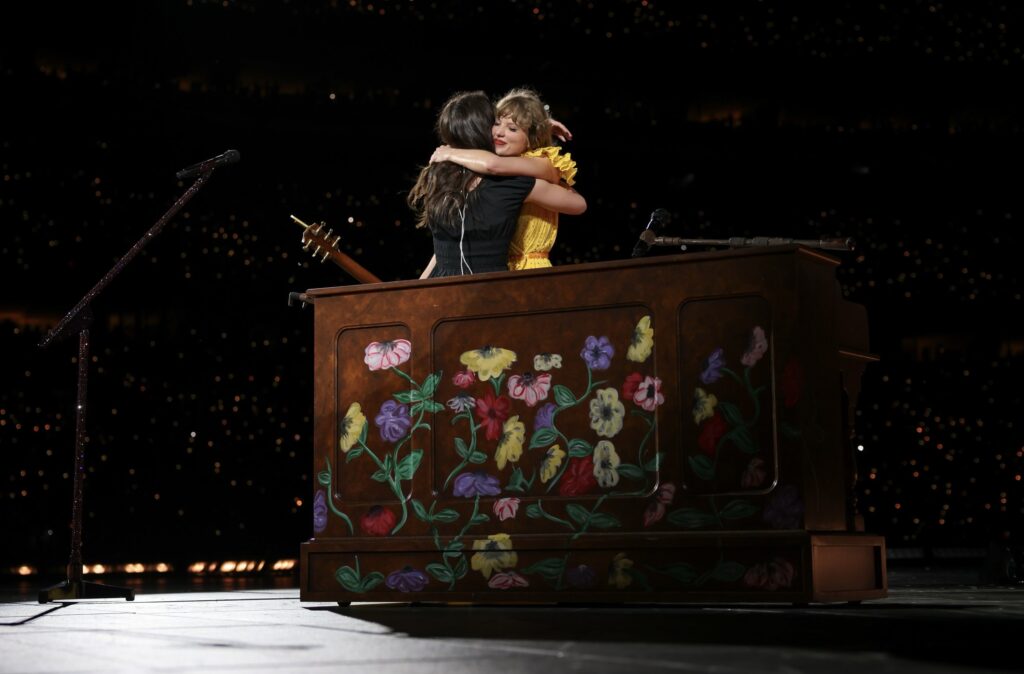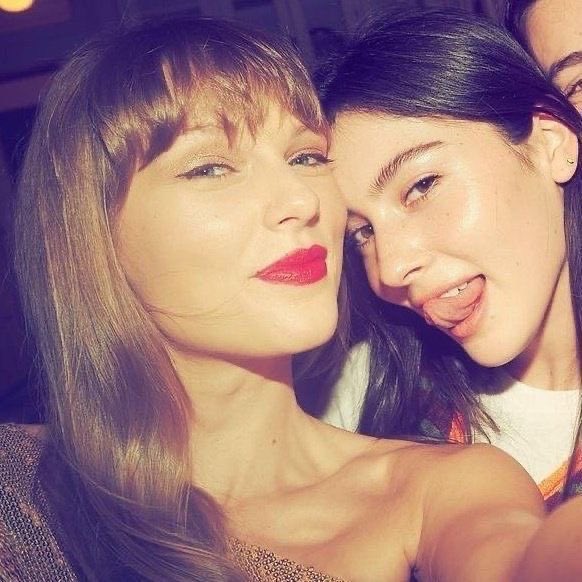It’s Me, Hi
In the realm of music, where melodies become stories and lyrics paint emotions, there’s a fascinating connection between two distinct voices: Taylor Swift and Gracie Abrams. Gracie Abrams, an upcoming female artist, had the honor of opening for Taylor Swift during the “Eras Tour.”
Fun fact: Gracie Abrams’ talent has a familial touch, as J.J. Abrams, known for his filmmaking, is Gracie’s father. Just as J.J. Abrams crafts narratives that engage our minds, Taylor Swift and Gracie Abrams, through their songs, invite us to explore the depths of our hearts, weaving a bond that extends beyond mere melodies.
Both Taylor Swift and Gracie Abrams possess a rare ability to beautifully express the complexities of love, longing, and vulnerability into their music. Despite the apparent contrasts in style and era, they share a common ground in the emotions they infuse into their music. Taylor Swift and Gracie Abrams encourage listeners to contemplate relationships, personal growth, and life’s twists and turns. Exploring the common themes in their songs reveals a beautiful collaboration of shared experiences, creating a vivid picture of two unique artists blending together in the rich art of musical storytelling.

Block Me Out by Gracie Abrams → The Archer by Taylor Swift
Two songs that find resonance are Gracie Abrams’ “Block Me Out” and Taylor Swift’s “The Archer”. These compositions stand as the epitome of vulnerability for both artists, demonstrating an extraordinary parallel in their emotional openness.
In “Block Me Out,” Gracie Abrams painfully sings, “Don’t know how they see me now. Feelin’ lost in every crowd, I feel ten feet off the ground. I wish that I could block me out.” This sentiment aligns with “The Archer,” where Taylor Swift confesses, “They see right through me, I see right through me.” These lyrics unveil a shared understanding that in the midst of crowds, their inner selves are exposed, and they grapple with the desire to shield themselves from the world’s gaze.
Furthermore, in “Block Me Out,” Abrams muses, “It’s not their fault, but I’ve found that none of my friends will call me,”while in “The Archer,” Taylor Swift echoes a similar sentiment, “‘Cause all of my enemies started out friends.” These lines encapsulate their awareness of the intricate dynamics of relationships, where trust is both forged and fractured.
The most striking convergence emerges in theses next lyrics, almost as if they’re in each other’s thoughts. Taylor Swift sings, “The room is on fire, invisible smoke,” while Gracie Abrams mourns, “I think I’m burnin’ alive, but nobody sees the fire.” The metaphor of an unseen fire consuming their internal worlds is hauntingly beautiful, resonating with shared vulnerability.
Gracie Abrams and Taylor Swift’s uncanny ability to capture the depth of their feelings, showcased in “Block Me Out” and “The Archer,” reveals an unmistakable kinship. These songs stand as a testament to their mutual exploration of the most delicate corners of the human experience, vulnerability that is both heart-rending and profoundly beautiful.
Wishful Thinking by Gracie Abrams → Cardigan by Taylor Swift
“Wishful Thinking” by Gracie Abrams and “Cardigan” by Taylor Swift are two songs that share striking similarities in their themes and narratives. While “Cardigan” is a notable part of the Folklore love triangle, focusing on the dynamics of the Betty-James-Augustine relationship, it could be a unique approach to view “Wishful Thinking” as the aftermath of Betty discovering James and Augustine’s fling.
The lyrics of “Wishful Thinking” include lines like “Flaked on me back in August,” hinting at James’ absence during a crucial time, possibly due to his involvement with Augustine. Similarly, “Wishful Thinking” touches on the theme of rumors and secrets, in the same way that Betty hears about James’ infidelity through the line “You heard the rumor from Inez.” These lines in both songs reflect the emotional impact of hidden truths and external perceptions on the protagonists’ relationships.
Furthermore, both songs convey a sense of longing for transformation within their partners. In “Wishful Thinking,” Gracie Abrams expresses her desire for her partner to mature and take responsibility, mirroring Betty’s sentiment in “Cardigan.” Betty’s plea, “Tried to change the ending, Peter losing Wendy,” serves as a poignant metaphor for James’ reluctance to grow up, paralleling the theme of stagnation found in “Wishful Thinking.”
Both songs ultimately encapsulate the shared theme of a faltering relationship marked by unfulfilled expectations and the desire for more effort from the male partners.

Best by Gracie Abrams → Back To December by Taylor Swift
Two songs that share a remarkably similar theme are “Best” by Gracie Abrams and “Back To December” by Taylor Swift. In these melodies, both Abrams and Swift explore the notion of looking back on past relationships with a sense of regret, acknowledging their own mistakes in treating their partners.
“Back To December” carries a weight of reflection, as Taylor Swift laments, “You gave me all your love and all I gave you was goodbye.” This realization of the imbalance in affection and reciprocation finds a parallel in “Best” with the lyric, “You fell hard, I thought, ‘Good riddance’.” In both cases, the songs illustrate a realization that their partners extended genuine love, only to receive heartache and detachment in return.
“Back To December” serves as a sincere plea for reconciliation and a second chance. Taylor Swift’s words express regret and a yearning to amend her past mistakes. Conversely, “Best” takes on a more introspective tone, summarizing the aftermath of a relationship where the one person recognizes the gravity of their mistakes. Despite the slight difference in approach, both songs acknowledge their own shortcomings and the role they played in the relationship’s downfall.
Both tracks stand as reminders of the consequences of not treating their partners with the care and consideration they deserved. These songs capture the universal experience of looking back, reflecting, and owning up to one’s actions in the realm of love and relationships.
The Bottom by Gracie Abrams → Peace by Taylor Swift
“The Bottom,” a track from Gracie Abrams’ debut EP This Is What It Feels Like, converges with Taylor Swift’s “Peace,” each unraveling a tale of introspection and self-awareness. Despite their different sounds, these songs unite in their shared theme of acknowledging personal limitations and the struggle to meet the emotional needs of their partners.
In “The Bottom,” a hidden depth emerges as she confesses, “I’m happier when I’m sad. So leave and never come back.”The difference between her lively music and honest lyrics highlights the understanding that her emotional world might not always bring lasting happiness to her partner. Similarly, “Peace,” within Taylor Swift’s artistry, unveils the line, “I’d give you my sunshine, give you my best, but the rain is always gonna come if you’re standing with me.” This sentiment of inevitability captures both Taylor Swift and Gracie Abrams shared understanding that their emotional clouds may cast shadows upon their loved ones.
While “The Bottom” extends a cautionary note, advising Gracie Abrams’ partner to leave her, “Peace” embraces a theme of acceptance, illuminating Taylor Swift’s inability to shield her partner from the emotional storms that come with her. Together, these songs echo the realization that they may fall short in providing the emotional haven their partners yearn for.
“The Bottom” and “Peace” demonstrate the intricacies of how one’s internal struggles can affect their romantic journey. Anchored by Gracie Abrams’ debut EP and Taylor Swift’s timeless artistry,
these songs authentically express the struggle of not being able to offer emotional comfort.

The Blue by Gracie Abrams → State Of Grace by Taylor Swift
“The Blue” by Gracie Abrams and “State of Grace” by Taylor Swift share a captivating parallel, both capturing the essence of unexpected love.
In “State of Grace,” Taylor Swift’s voice captures the sentiment, “I never saw you coming, and I’ll never be the same,”while Gracie Abrams in “The Blue” sings, “You came out of the blue like that. I never could’ve seen you coming.” These lines mirror each other, painting a picture of a love that arrived unanticipated, yet altered their lives profoundly. Both verses depict a deeply felt affection that took them by surprise, leaving an indelible mark.
Another pair of lyrics – when Gracie Abrams sings, “I’ve never felt this close to someone, what if you’re my weakness?” and Taylor Swift says, “You come around and the armor falls,” – showcase the vulnerability and openness that their significant others bring forth. It’s evident that both Abrams and Taylor Swift share a similar experience – an affection that renders them defenseless and exposed.
The emotion Taylor Swift conveys in “State of Grace” resonates with the love Gracie Abrams encapsulates in “The Blue.” Their songs evoke a sense of a rare and profound connection, one that sweeps them off their feet and leaves them deeply and irrevocably in love, uniting Taylor Swift and Gracie Abrams in their lyrical representation of an unexpected romance that has profoundly touched their hearts.
Stay by Gracie Abrams → All You Had To Do Was Stay by Taylor Swift State Of Grace by Taylor Swift
Two more songs that echo a familiar message are “Stay” by Gracie Abrams and “All You Had To Do Was Stay” by Taylor Swift. Though their expressions vary, these songs harmonize in their shared themes, speaking to the universal experiences of longing and loss within relationships.
Abrams sings, “I don’t care if you’ve changed,” while Taylor Swift offers, “And people like me wanna believe you when you say you’ve changed.” These differing renditions converge in a common sentiment – both artists want that connection from the past, no matter the changes that have happened. Parallel sentiments extend to Taylor Swift’s lyric, “Then why’d you have to go and lock me out when I let you in?” and Gracie Abrams’ reflection, “I held myself ’cause you wouldn’t, all wrapped in my sweatshirt. Wonder if you even noticed that that one was yours.” Both narratives highlight the imbalance in effort and vulnerability, where one invests deeply while the other does not reciprocate or acknowledge it.
A further kinship surfaces with Gracie Abrams’ plea, “I don’t even have to stay,” aligning with Taylor Swift’s lyric, “Hey, all you had to do was stay.” Though both take a different meaning on the use of stay, there is a shared essence of being rejected and left behind. Swift attributes the departure to the other person, whereas Abrams implies her willingness to return, even if not forever, demonstrating two forms of abandonment.
In these songs, Gracie Abrams and Taylor Swift’s melodic expressions evoke the complexness of a rollercoaster-like-love, resonating with listeners on a profound level.
I Miss You I’m Sorry by Gracie Abrams → I Wish You Would by Taylor Swift State Of Grace by Taylor Swift
Finishing the thread of emotive connection, “I Miss You I’m Sorry” by Gracie Abrams and “I Wish You Would” by Taylor Swift encapsulate a shared theme of yearning and nostalgia, both yearning to recapture a relationship that has slipped through their grasp.
In “I Wish You Would,” Taylor Swift resonates with heartfelt emotion as she sings, “Wish you knew that I miss you too much to be mad anymore.” This line expresses a strong desire to let go of resentment and instead feel the powerful pull of deeply missing someone. In parallel, “I Miss You I’m Sorry” echoes this sentiment with Gracie Abrams’ declaration, “And I know you said that we’re not talkin’, but I miss you, I’m sorry.” Both songs mirror the deep-seated yearning for a connection that circumstances have severed.
The core essence of both songs lies in the ache for things to revert to how they once were. They encapsulate the universal desire to rewind time, to reclaim the moments of connection and happiness that have been overshadowed by distance or discord.

I’ll Tell You The Truth But Never Goodbye
As we celebrate Gracie Abrams’ debut album, “Good Riddance,” alongside the ever-expanding tapestry of Taylor Swift’s remarkable discography, this exploration has shed light on the intriguing similarities between these two remarkable female voices in the music industry. Through their lyrics, melodies, and shared themes, Abrams and Swift have crafted an enriching dialogue that transcends boundaries, reminding us of the profound impact that music has in uniting souls and telling the stories of the human heart.
